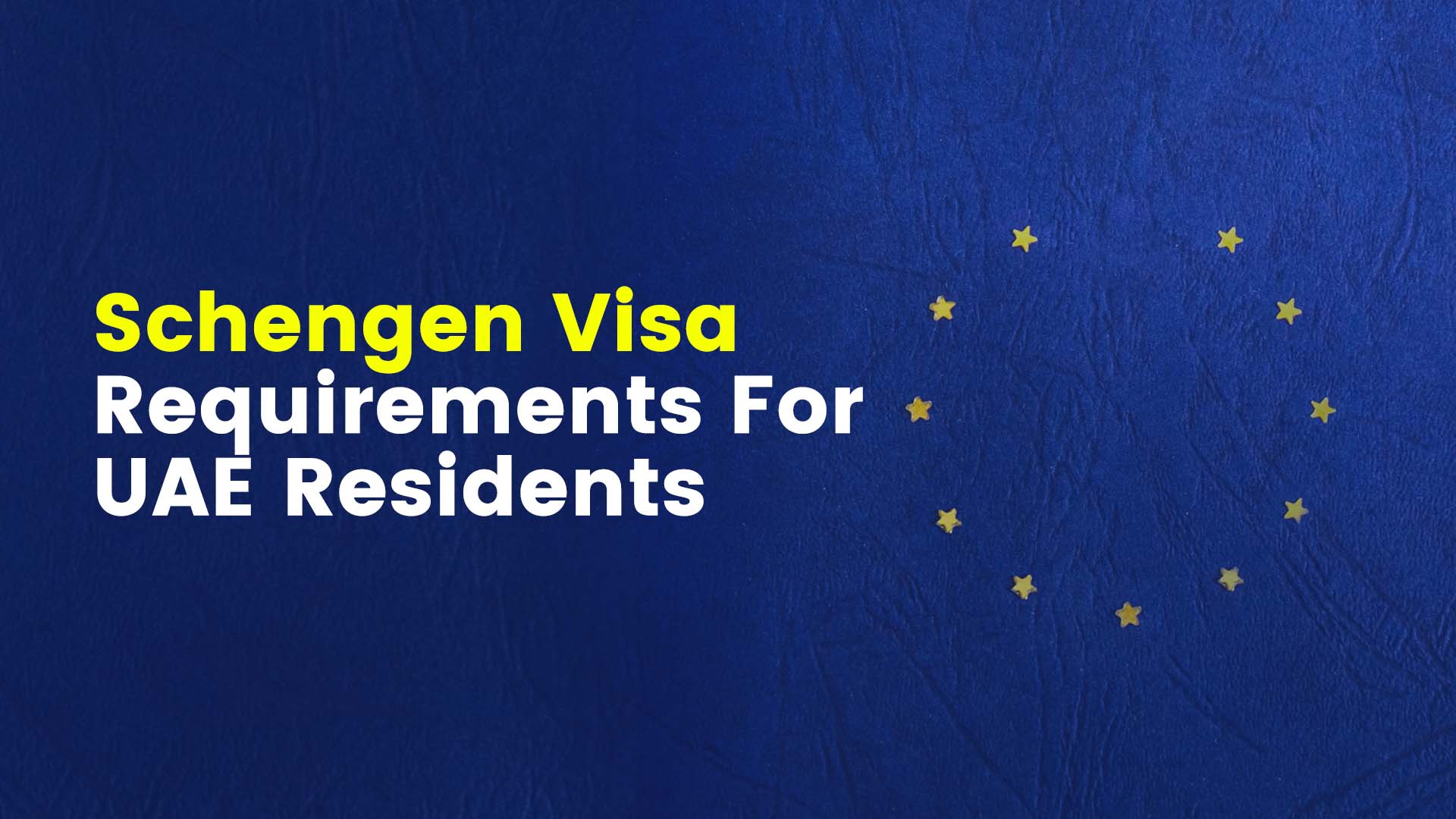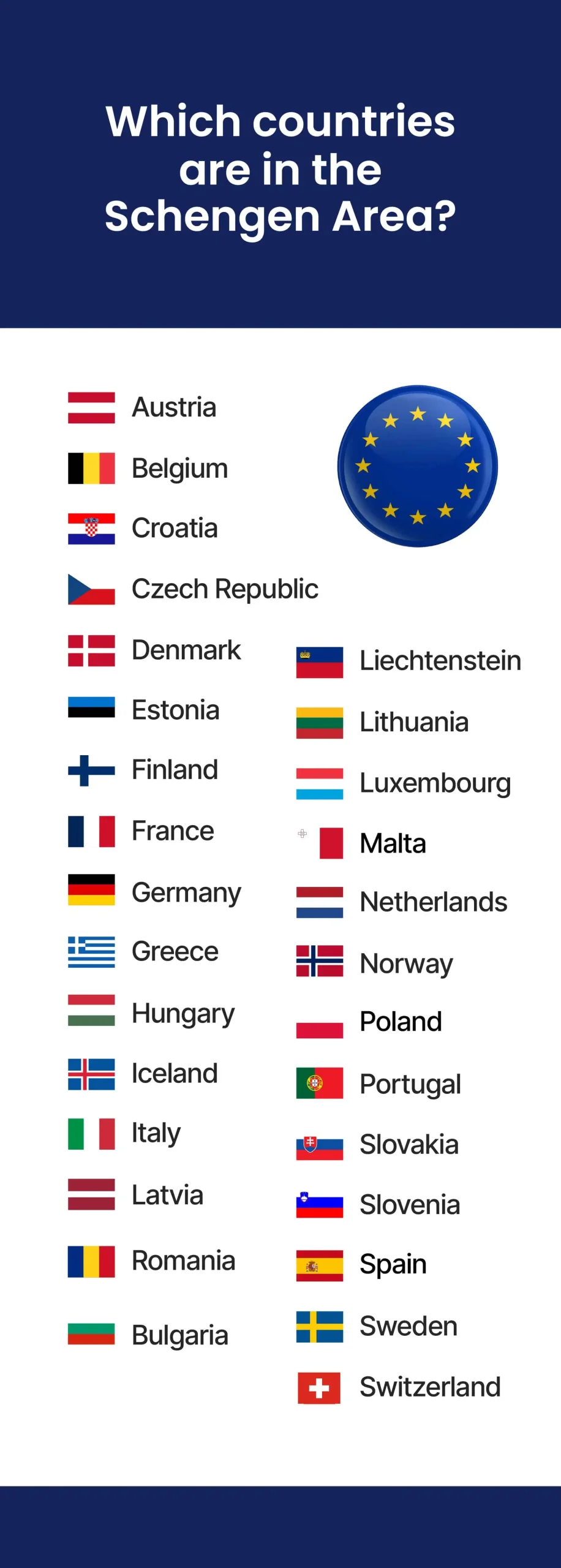
The Schengen Area is a group of 29 European countries that have abolished passports and other types of border control at their mutual borders. This means that anyone who enters the Schengen Area can travel freely between the countries within the area without the need for a new visa or passport check. However, citizens of certain countries need to obtain a Schengen visa to enter the Schengen Area. In this blog post, we will be discussing the Schengen visa requirements for UAE residents who want to visit any of the Schengen countries.
Which countries are in the Schengen Area?

The 29 countries in the Schengen Area are Austria, Belgium, Czech Republic, Denmark, Estonia, Finland, France, Germany, Greece, Hungary, Iceland, Italy, Latvia, Liechtenstein, Lithuania, Luxembourg, Malta, Netherlands, Norway, Poland, Portugal, Slovakia, Slovenia, Spain, Sweden, Switzerland, Croatia, Bulgaria, and Romania. Nationals of some countries are exempt from the Schengen visa requirement, while others are required to obtain a visa before entering the Schengen Area.
Schengen Visa Requirements for UAE Residents:
UAE citizens can travel without a Schengen visa in the European countries part of the Schengen Area. However, they will still need to present some documents at the port of entry, including their UAE passport or travel document, evidence of their purpose of visit, and proof that they have the required financial means to support their stay in the Schengen Area.
Documents required for a Schengen visa from the UAE
For UAE residents who do not hold a UAE passport and do not belong to any of the Schengen visa-exempt categories, a Schengen visa is required to enter the Schengen Area. The Schengen visa allows the holder to enter and travel within the Schengen Area for a maximum of 90 days within a 180-day period.
To apply for a Schengen visa from the UAE, applicants need to provide the following documents:
- Original Passport: Your passport must be valid for at least 6 months and have a minimum of 2 blank pages.
- UAE Residence Visa: If you are an expat living in the UAE, your residence visa should be valid for at least 6 more months.
- 2 Passport Size Photos: A recent photo with a white background.
- Emirates ID: A copy of the front and back of your Emirates ID.
- Bank Statement: An attested bank statement for the last 6 months.
- Tenancy Contract: A copy of your UAE residence tenancy contract.
- Travel Insurance: A valid travel insurance certificate, along with a copy of your return flight ticket.
- Additional Documents: Additional documents may be required depending on your case. For the exact requirements at the time of your travel, contact The Visa Guy.
Common issues that UAE residents may face when applying for a Schengen visa include:
- Lack of documentation: Many applicants fail to provide all the required documentation, leading to the rejection of their visa application.
- Incomplete or inaccurate application forms: Applicants must complete the visa application form accurately and thoroughly to avoid delays or rejections.
- Previous visa rejections: If an applicant has been previously refused a Schengen visa, they may face additional scrutiny when applying for a new visa.
- Financial means requirement: Applicants must demonstrate sufficient financial resources to support their stay in the Schengen Area. This includes providing bank statements or proof of employment and income.
Also read: Top Reasons for UK Visa Denials and How to Avoid Them
Tips for a Successful Schengen Visa Application
Here are some tips to help UAE residents increase their chances of getting their Schengen visa approved:
- Plan: Applicants should begin the visa application process well in advance of their intended travel dates to avoid any last-minute issues. You can apply 6 months before the trip.
- Provide complete and accurate information: Applicants must fill out the visa application form accurately and completely and provide all the required documentation to avoid any delays or rejections.
- Show strong ties to the UAE: Applicants should provide evidence of their strong ties to the UAE, such as proof of employment, property ownership, or family relationships, to show that they are likely to return to the UAE after they visit the Schengen Area.
- Seek professional assistance: Applicants may consider seeking professional assistance from a visa consultant or a travel agency to help them navigate the visa application process.
The Schengen visa fee for UAE residents varies depending on the type of visa and the duration of stay. As of 2026, the Schengen visa fee for adults is 80 Euros for a single-entry visa. Children between the ages of 6 and 12 pay a reduced fee of 40 Euros for a single-entry visa. Children under the age of 6 are exempt from the visa fee.
In addition to the visa fee, applicants may need to pay additional fees for services such as courier delivery or document translation.
Schengen Visa Processing Time and Fees for UAE Residents 2026
The processing time for a Schengen visa typically takes about 15 working days. However, this can vary depending on the embassy handling your application.
The standard fee for a Schengen visa is €90 (around AED 339) for adults. In addition to this, there may be an appointment fee, which varies based on the country you are applying to.
It’s best to apply for your visa at least 90 days before your planned travel date. While applications can be submitted up to 180 days in advance, applying early gives you enough time to handle any unexpected delays.
Planning and being aware of the fees and processing times will make your Schengen visa application smoother and stress-free.
Conclusion
Schengen visa requirements for UAE residents vary depending on their nationality and the purpose of travel. While UAE passport holders do not need to have a Schengen visa to enter the Schengen Area, residents of other nationalities living in the UAE may need to obtain a Schengen visa. To apply for a Schengen visa, UAE residents must gather all the required documents, schedule a visa interview for submission of documents, and pay the visa fee. By following the tips provided in this article, UAE residents can increase their chances of a successful Schengen visa application.
Also Read: ETIAS Visa for UAE Residents
FAQ
1. What is a Schengen Visa?
A Schengen Visa is a short-stay visa that allows visitors to travel to any of the 29 European countries of the Schengen Area for up to 90 days within 180 days. Read this blog io learn more about the different types of Schengen visas.
2. How to Get a Schengen Visa from Dubai
Identify the Schengen country where you’ll be spending the most time or where your primary purpose of visit lies.
- Gather Required Documents: Collect your Passport (valid for at least 3 months beyond your intended stay), Visa Application Form, Recent passport-sized photographs, Travel Medical Insurance, Proof of Accommodation (hotel bookings, invitation letter), Proof of Financial Means (bank statements, etc.), Round-trip Flight Tickets, Travel Itinerary, Proof of Civil Status (if applicable)
- Schedule an Appointment: Book an appointment at the embassy or consulate of your main destination country in Dubai.
- Submit Application: Submit your completed application form and all supporting documents in person.
- Pay Visa Fees: Pay the applicable visa fees in the designated currency.
- Biometric Data: Provide your fingerprints and photographs.
- Wait for Decision: The processing time for a Schengen Visa can vary.
3. Which Schengen Visa is the Easiest to Get from Dubai?
There’s no universally “easiest” Schengen Visa. The ease of obtaining a visa depends on individual circumstances and the specific requirements of each country. However, some countries may have slightly less stringent requirements or faster processing times.
4. How Long Does a Schengen Visa Last?
A Schengen Visa is typically valid for up to 90 days within a 180-day period. The exact duration depends on the type of visa and the issuing country.
5. Can I Travel to Multiple Schengen Countries with One Visa?
Yes, a single Schengen Visa allows you to travel to any of the 29 Schengen countries within the validity period of the visa.
If you are a UAE resident, you can easily apply for a Schengen visa from the UAE by submitting the required documents through the appropriate embassy or authorised visa centre.
6. Do I Need a Visa for All Schengen Countries?
Yes, you generally need a visa to enter any of the Schengen countries, regardless of your nationality. However, some nationalities may be eligible for visa-free travel under certain conditions.
7. What Are the Common Reasons for Schengen Visa Rejection from Dubai?
- Insufficient Financial Means: Not being able to demonstrate sufficient funds to cover your travel expenses.
- Lack of Travel Medical Insurance: Not having adequate travel insurance that meets Schengen visa requirements.
- Incomplete or Inaccurate Application: Submitting a visa application with missing information or incorrect details.
- Suspicious Travel Itinerary: Providing a travel itinerary that raises concerns about your travel intentions.
- Previous Visa Violations: Having a history of visa violations or overstaying in Schengen countries.
- Security Concerns: If your application raises security concerns for the issuing country.


